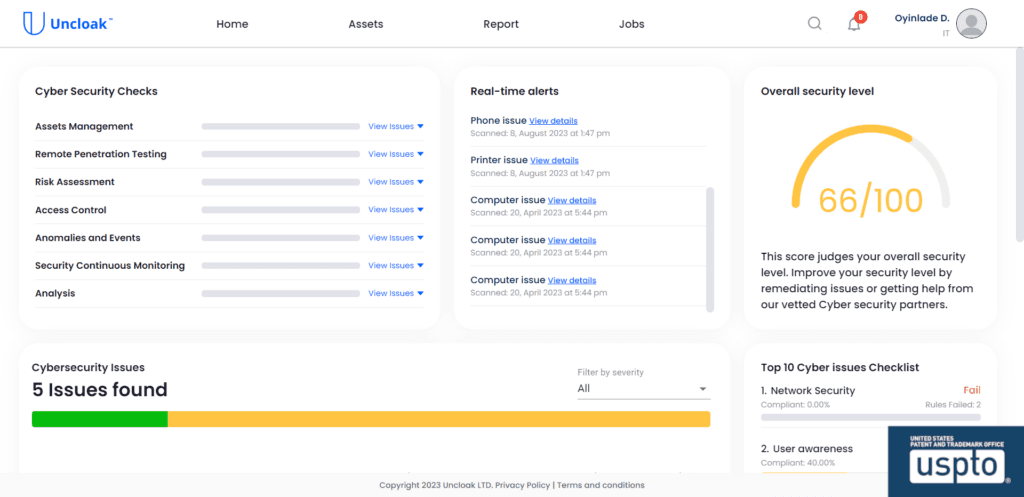Introduction
The threat of cyber threats and attacks is no longer a hypothetical scenario that businesses can ignore. Every year, thousands of companies suffer from some form of cyber attack, and the impact can be devastating. If your business is not prepared or equipped to handle such scenarios, then you risk losing millions of dollars, data breaches, damage to reputation, and potential loss of business. With technology moving rapidly, it has become a necessity for companies of all sizes to prioritize the security of their networks, data, and infrastructure. In this blog post, we will provide you with ten essential tips for implementing an effective cyber security strategy for your business.
Essential Tips
- Create a culture of security – Cyber security is not just the responsibility of the IT team, but it’s also everyone’s responsibility. It’s crucial to educate all employees about the importance of security measures such as password management, email phishing, network encryption, device security, etc. Additionally, creating a security culture that’s well ingrained and enforced within your company helps set the tone for other security implementations.
- Hire a cyber security consulting firm – As a business owner, you need to focus on growing your business, and that’s why you should leave your cyber security to the professionals. Given the rise in cyber threats, many businesses hire cyber security firms that specialize in managing and protecting their networks and infrastructure from cyber attacks. Consulting a cyber security firm can help you identify vulnerabilities, analyse risks, and develop customized security plans tailored to your business.
- Implement cyber essentials plus – Cyber Essentials Plus is a scheme provided by the UK government in partnership with the Information Assurance for Small and Medium Enterprises (IASME) consortium. Cyber Essentials Plus helps ensure your business’s infrastructure is protected against the most common cyber attacks. Implementing schemes such as Cyber Essentials Plus demonstrates your commitment to cyber security and can be a selling point for your business.
- Regularly update your software and systems – Regularly updating software and systems may seem like a hassle, but it’s one of the most critical processes in securing your network. Outdated software systems and apps may contain vulnerabilities that can be exploited by attackers to gain access to your network. Ensure that you’ve installed the latest security updates and patches, particularly for critical apps and operating systems.
- Perform regular risk assessments – Performing frequent risk assessments will help you identify which systems, data, or assets are more valuable to your business and attract potential cyber attacks. Risk assessments help you put in place the necessary measures to mitigate risks such as implementing additional security measures, data backups, and data recovery plans.
- Secure your data – Securing data is a paramount factor in your cyber security strategy. It’s vital to encrypt sensitive data, and implementing data backup plans can help mitigate disastrous data loss or breach scenarios. Additionally, controlling data access ensures that data is only available to authorized personnel.
- Use multi-factor authentication – Multi-factor authentication is a two-step verification process that adds an extra layer of security to your system. It requires users to provide authentication using something they have and something they know before granting access, thereby increasing security.
- Get cyber security insurance – Although cyber security insurance is not a security technology, it’s a smart investment that can protect your business from financial losses resulting from cyber attacks. Cyber security insurance provides you with cover in the event of a data breach or cyber attack, thereby shielding your business from devastating financial and reputational losses.
- Keep your employees informed and trained – Cybersecurity awareness training for employees is essential, as most cyber attacks come from human error. Employees should be aware of potential cybersecurity risks and the best practices in protecting sensitive data.
- Hire a company for security – A security company offers cutting-edge security services that are miles better than what most businesses can afford in-house. Companies specializing in cybersecurity can offer your business a wide range of security solutions that include monitoring your infrastructure, regularly scanning for potential vulnerabilities, and updating your security measures for compliance with cybersecurity requirements.
Conclusion
There is no ‘one-size-fits-all’ solution when it comes to cyber security since every company must identify its unique risks and requirements. However, implementing a comprehensive cyber security strategy has become a necessity, especially given the increasing number of cyber threats. Following our ten tips for an effective cyber security strategy outlined in this post can go a long way in mitigating the risks posed by cyber threats. Regardless of the size of your business, the consequence of an unsecured network and infrastructure can have dire consequences, so make sure you invest in comprehensive cyber security measures.

